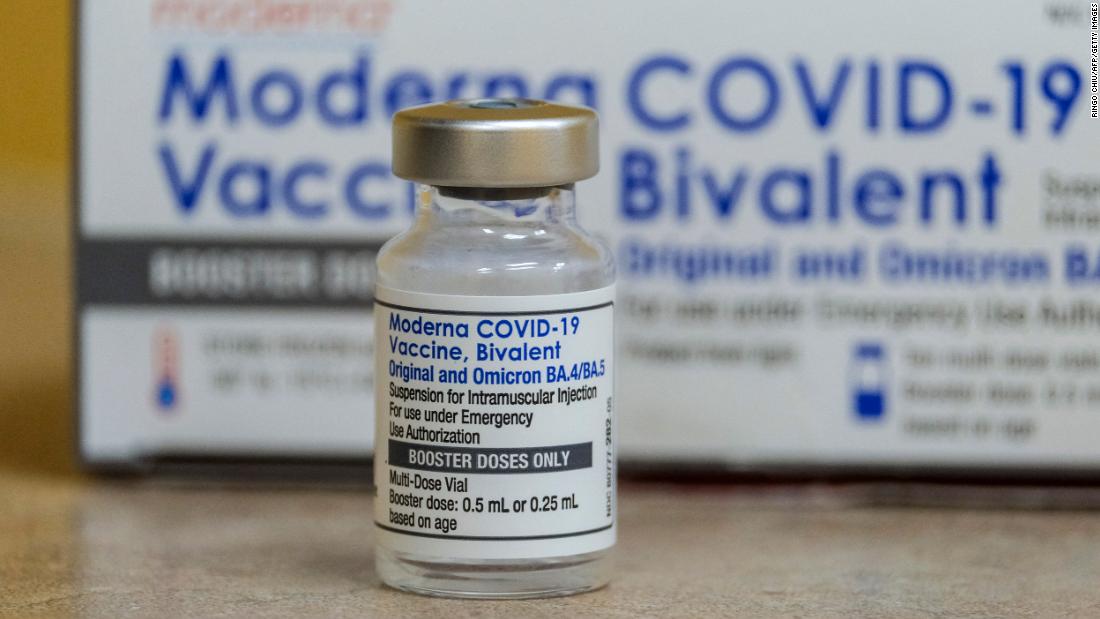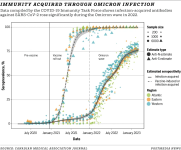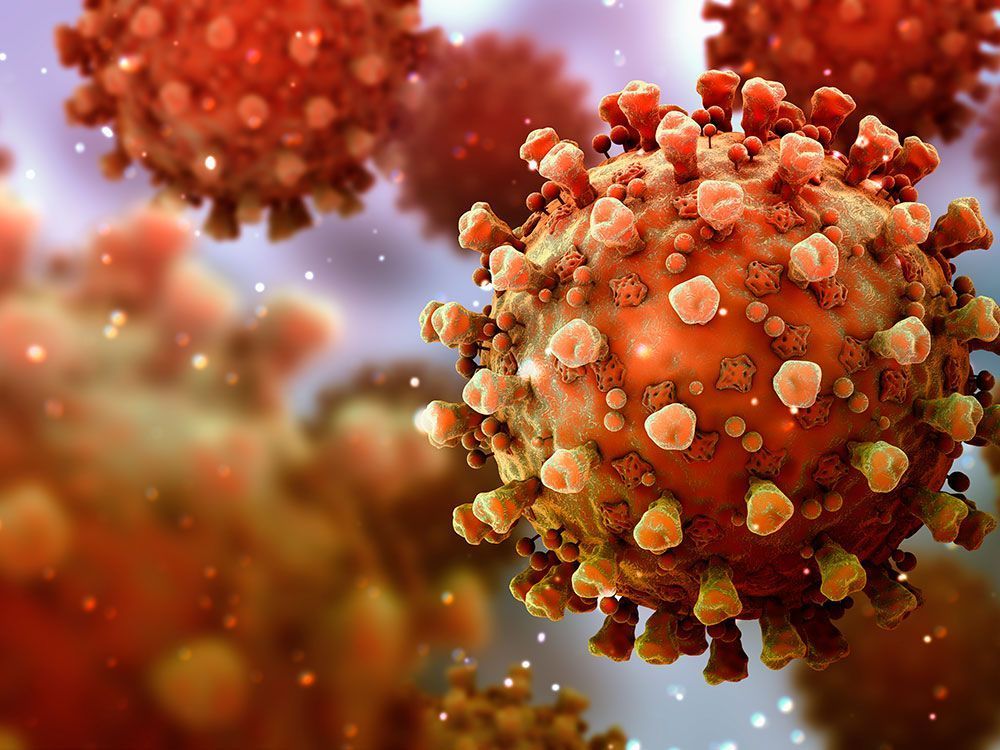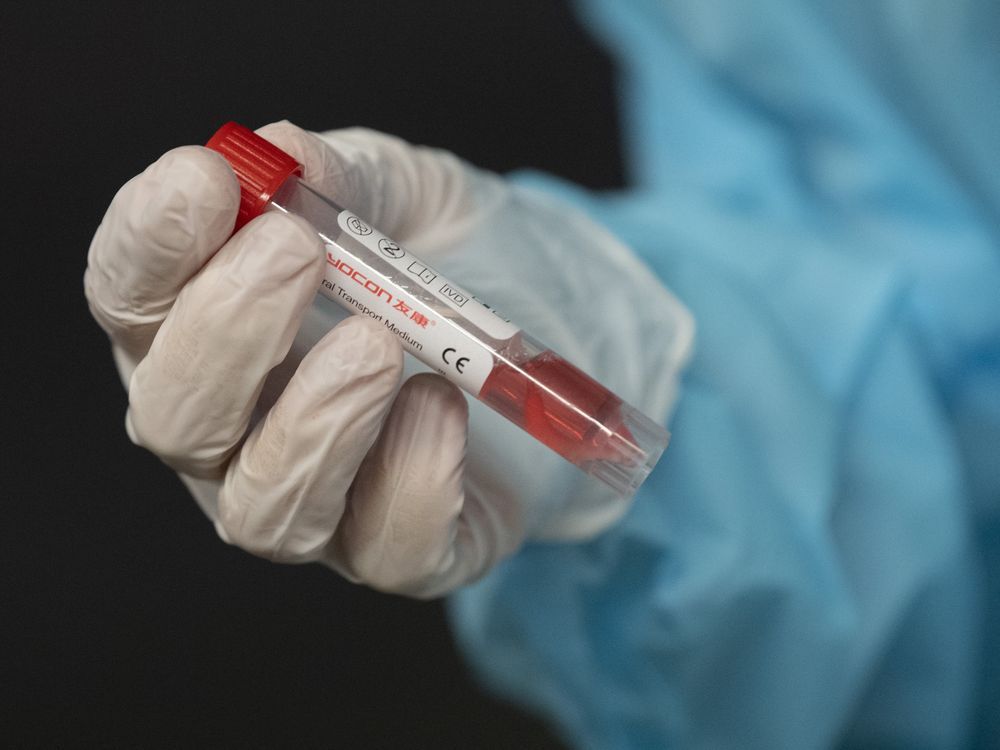"After your second dose you can't get sick or spread the disease." 100% resistance.Or 2 weeks to kill the spread.
Omicron
- Thread starter Tecumsehsbones
- Start date
You are using an out of date browser. It may not display this or other websites correctly.
You should upgrade or use an alternative browser.
You should upgrade or use an alternative browser.

FDA vaccine advisers 'disappointed' and 'angry' that early data about new Covid-19 booster shot wasn't presented for review last year
Some vaccine advisers to the federal government say they're "disappointed" and "angry" that government scientists and the pharmaceutical company Moderna didn't present a set of infection data on the company's new Covid-19 booster during meetings last year when the advisers discussed whether the...
Safe and effective .Another dud.
FDA vaccine advisers 'disappointed' and 'angry' that early data about new Covid-19 booster shot wasn't presented for review last year
Some vaccine advisers to the federal government say they're "disappointed" and "angry" that government scientists and the pharmaceutical company Moderna didn't present a set of infection data on the company's new Covid-19 booster during meetings last year when the advisers discussed whether the...amp.cnn.com
Omicron led to 76 per cent of Canadians being infected with COVID-19: study
"The fact that antibodies wane after about six months and the fact that this virus is always mutating means that although we lived through the public health emergency, we’re not out of the woods."
Author of the article:René Bruemmer
Published Aug 14, 2023 • Last updated 1 day ago • 3 minute read
The COVID-19 Immunity Task Force has supported 120 research studies focused on immunity to SARS-CoV-2.
The COVID-19 Immunity Task Force has supported 120 research studies focused on immunity to SARS-CoV-2. PHOTO BY GETTY IMAGES
In the year after COVID-19 first hit Canada, fewer than one in 100 people were infected with the disease. Even after 20 months, only nine per cent of Canadians had contracted COVID-19 by November 2021.
That would all change with Omicron. Half a year after the new, highly contagious variant of the SARS-CoV-2 virus first started cropping up in December 2021, nearly half the population would become infected, despite the fact most Canadians were fully vaccinated. By March 2023, after 16 months dominated by the variant, 76 per cent of Canadians had developed immunity due to an infection. Rates were even higher among younger segments of the population.
The findings on infection-fuelled immunity — as opposed to vaccine protection — were published Monday in the Canadian Medical Association Journal (CMAJ), based on a study carried out by the COVID-19 Immunity Task Force (CITF), with the help of a Canada-wide team of collaborating scientists.
“Despite high vaccine coverage in Canada, the rate of infection rose rapidly with the highly contagious Omicron variant,” said Bruce Mazer, study co-lead and senior scientist at the research institute of the McGill University Health Centre. “After six months with the Omicron variant circulating in Canada, in mid-June 2022, infection-acquired seroprevalence had risen to 47 per cent, with an average monthly increase of 6.4 per cent.”
Chart shows vaccine-acquired antibodies rising quickly to near 100% but infection-acquired antibodies rising later through the Omicron wave
The results were collected via data looking at 900,000 samples primarily derived from blood donors, as well as estimates from provincial laboratory studies that tested residual blood samples from people of all ages.
Omicron combined with looser restrictions sparked the latest wave, especially among younger people.
“During Omicron, rates of infection-acquired immunity increased faster in younger age groups and in the western provinces of Manitoba, Saskatchewan, Alberta and British Columbia,” said study co-lead David Buckeridge, a professor of global health at McGill.
“By March 2023, roughly 80 per cent of adults aged 18-25 had evidence of a previous infection. That’s compared to approximately 75 per cent of those aged 25-39 years, 70 per cent of those aged 40-59 years, and 60 per cent of those 60 and over.”
Canadians were fortunate that despite the rapid spread of infection there weren’t more severe illnesses or deaths, thanks to high rates of vaccination, Buckeridge said.
Quebec and other provinces in Canada are planning to roll out a new vaccine campaign in the fall, with vaccines tailored to more recent variants of Omicron. Numbers of COVID-19 infections in Quebec have been rising slowly in recent weeks, in part due to the arrival of a new, highly transmissible variant dubbed Eris, but the number of severe illnesses and fatalities has stayed relatively low.
Despite the immunity granted from high levels of infections and vaccinations, “the fact that antibodies wane after about six months and the fact that this virus is always mutating means that although we lived through the public health emergency, we’re not out of the woods,” Buckeridge said in an interview. “People will need to keep their eyes on it, unfortunately, and need to listen to what advice they get from their family doctors and also the provincial authorities around vaccination.”
The CITF, which is funded by the Public Health Agency of Canada, has supported 120 research studies focused on immunity to SARS-CoV-2, often among under-represented populations and those living in long-term care.
“The study showed us that there is a lot of variation in how the population was infected, and how they responded to infections, as well as vaccinations,” Buckeridge said. “Going forward, we need to monitor that and to use the information to allow people to make better decisions, but also on how to make better policy decisions on when we should be promoting other types of vaccine studies or actions that might be more beneficial to the population.”
rbruemmer@postmedia.com

![covid-0809[1].jpg covid-0809[1].jpg](https://forums.canadiancontent.net/data/attachments/17/17258-3aac71aad71a727427f3783ba918742c.jpg)

 cmaj.ca
cmaj.ca

 torontosun.com
torontosun.com
"The fact that antibodies wane after about six months and the fact that this virus is always mutating means that although we lived through the public health emergency, we’re not out of the woods."
Author of the article:René Bruemmer
Published Aug 14, 2023 • Last updated 1 day ago • 3 minute read
The COVID-19 Immunity Task Force has supported 120 research studies focused on immunity to SARS-CoV-2.
The COVID-19 Immunity Task Force has supported 120 research studies focused on immunity to SARS-CoV-2. PHOTO BY GETTY IMAGES
In the year after COVID-19 first hit Canada, fewer than one in 100 people were infected with the disease. Even after 20 months, only nine per cent of Canadians had contracted COVID-19 by November 2021.
That would all change with Omicron. Half a year after the new, highly contagious variant of the SARS-CoV-2 virus first started cropping up in December 2021, nearly half the population would become infected, despite the fact most Canadians were fully vaccinated. By March 2023, after 16 months dominated by the variant, 76 per cent of Canadians had developed immunity due to an infection. Rates were even higher among younger segments of the population.
The findings on infection-fuelled immunity — as opposed to vaccine protection — were published Monday in the Canadian Medical Association Journal (CMAJ), based on a study carried out by the COVID-19 Immunity Task Force (CITF), with the help of a Canada-wide team of collaborating scientists.
“Despite high vaccine coverage in Canada, the rate of infection rose rapidly with the highly contagious Omicron variant,” said Bruce Mazer, study co-lead and senior scientist at the research institute of the McGill University Health Centre. “After six months with the Omicron variant circulating in Canada, in mid-June 2022, infection-acquired seroprevalence had risen to 47 per cent, with an average monthly increase of 6.4 per cent.”
Chart shows vaccine-acquired antibodies rising quickly to near 100% but infection-acquired antibodies rising later through the Omicron wave
The results were collected via data looking at 900,000 samples primarily derived from blood donors, as well as estimates from provincial laboratory studies that tested residual blood samples from people of all ages.
Omicron combined with looser restrictions sparked the latest wave, especially among younger people.
“During Omicron, rates of infection-acquired immunity increased faster in younger age groups and in the western provinces of Manitoba, Saskatchewan, Alberta and British Columbia,” said study co-lead David Buckeridge, a professor of global health at McGill.
“By March 2023, roughly 80 per cent of adults aged 18-25 had evidence of a previous infection. That’s compared to approximately 75 per cent of those aged 25-39 years, 70 per cent of those aged 40-59 years, and 60 per cent of those 60 and over.”
Canadians were fortunate that despite the rapid spread of infection there weren’t more severe illnesses or deaths, thanks to high rates of vaccination, Buckeridge said.
Quebec and other provinces in Canada are planning to roll out a new vaccine campaign in the fall, with vaccines tailored to more recent variants of Omicron. Numbers of COVID-19 infections in Quebec have been rising slowly in recent weeks, in part due to the arrival of a new, highly transmissible variant dubbed Eris, but the number of severe illnesses and fatalities has stayed relatively low.
Despite the immunity granted from high levels of infections and vaccinations, “the fact that antibodies wane after about six months and the fact that this virus is always mutating means that although we lived through the public health emergency, we’re not out of the woods,” Buckeridge said in an interview. “People will need to keep their eyes on it, unfortunately, and need to listen to what advice they get from their family doctors and also the provincial authorities around vaccination.”
The CITF, which is funded by the Public Health Agency of Canada, has supported 120 research studies focused on immunity to SARS-CoV-2, often among under-represented populations and those living in long-term care.
“The study showed us that there is a lot of variation in how the population was infected, and how they responded to infections, as well as vaccinations,” Buckeridge said. “Going forward, we need to monitor that and to use the information to allow people to make better decisions, but also on how to make better policy decisions on when we should be promoting other types of vaccine studies or actions that might be more beneficial to the population.”
rbruemmer@postmedia.com

![covid-0809[1].jpg covid-0809[1].jpg](https://forums.canadiancontent.net/data/attachments/17/17258-3aac71aad71a727427f3783ba918742c.jpg)

The evolution of SARS-CoV-2 seroprevalence in Canada: a time-series study, 2020–2023
Background: During the first year of the COVID-19 pandemic, the proportion of reported cases of COVID-19 among Canadians was under 6%. Although high vaccine coverage was achieved in Canada by fall 2021, the Omicron variant caused unprecedented numbers of infections, overwhelming testing capacity...

Omicron led to 76 per cent of Canadians being infected with COVID-19: study
'The fact that antibodies wane after about six months, and that this virus is always mutating, means we’re not out of the woods'
Omnicrom came from the vaccines. Delta wasn't spreading as fast as the propagandists wanted.Omicron led to 76 per cent of Canadians being infected with COVID-19: study
"The fact that antibodies wane after about six months and the fact that this virus is always mutating means that although we lived through the public health emergency, we’re not out of the woods."
Author of the article:René Bruemmer
Published Aug 14, 2023 • Last updated 1 day ago • 3 minute read
The COVID-19 Immunity Task Force has supported 120 research studies focused on immunity to SARS-CoV-2.
The COVID-19 Immunity Task Force has supported 120 research studies focused on immunity to SARS-CoV-2. PHOTO BY GETTY IMAGES
In the year after COVID-19 first hit Canada, fewer than one in 100 people were infected with the disease. Even after 20 months, only nine per cent of Canadians had contracted COVID-19 by November 2021.
That would all change with Omicron. Half a year after the new, highly contagious variant of the SARS-CoV-2 virus first started cropping up in December 2021, nearly half the population would become infected, despite the fact most Canadians were fully vaccinated. By March 2023, after 16 months dominated by the variant, 76 per cent of Canadians had developed immunity due to an infection. Rates were even higher among younger segments of the population.
The findings on infection-fuelled immunity — as opposed to vaccine protection — were published Monday in the Canadian Medical Association Journal (CMAJ), based on a study carried out by the COVID-19 Immunity Task Force (CITF), with the help of a Canada-wide team of collaborating scientists.
“Despite high vaccine coverage in Canada, the rate of infection rose rapidly with the highly contagious Omicron variant,” said Bruce Mazer, study co-lead and senior scientist at the research institute of the McGill University Health Centre. “After six months with the Omicron variant circulating in Canada, in mid-June 2022, infection-acquired seroprevalence had risen to 47 per cent, with an average monthly increase of 6.4 per cent.”
Chart shows vaccine-acquired antibodies rising quickly to near 100% but infection-acquired antibodies rising later through the Omicron wave
The results were collected via data looking at 900,000 samples primarily derived from blood donors, as well as estimates from provincial laboratory studies that tested residual blood samples from people of all ages.
Omicron combined with looser restrictions sparked the latest wave, especially among younger people.
“During Omicron, rates of infection-acquired immunity increased faster in younger age groups and in the western provinces of Manitoba, Saskatchewan, Alberta and British Columbia,” said study co-lead David Buckeridge, a professor of global health at McGill.
“By March 2023, roughly 80 per cent of adults aged 18-25 had evidence of a previous infection. That’s compared to approximately 75 per cent of those aged 25-39 years, 70 per cent of those aged 40-59 years, and 60 per cent of those 60 and over.”
Canadians were fortunate that despite the rapid spread of infection there weren’t more severe illnesses or deaths, thanks to high rates of vaccination, Buckeridge said.
Quebec and other provinces in Canada are planning to roll out a new vaccine campaign in the fall, with vaccines tailored to more recent variants of Omicron. Numbers of COVID-19 infections in Quebec have been rising slowly in recent weeks, in part due to the arrival of a new, highly transmissible variant dubbed Eris, but the number of severe illnesses and fatalities has stayed relatively low.
Despite the immunity granted from high levels of infections and vaccinations, “the fact that antibodies wane after about six months and the fact that this virus is always mutating means that although we lived through the public health emergency, we’re not out of the woods,” Buckeridge said in an interview. “People will need to keep their eyes on it, unfortunately, and need to listen to what advice they get from their family doctors and also the provincial authorities around vaccination.”
The CITF, which is funded by the Public Health Agency of Canada, has supported 120 research studies focused on immunity to SARS-CoV-2, often among under-represented populations and those living in long-term care.
“The study showed us that there is a lot of variation in how the population was infected, and how they responded to infections, as well as vaccinations,” Buckeridge said. “Going forward, we need to monitor that and to use the information to allow people to make better decisions, but also on how to make better policy decisions on when we should be promoting other types of vaccine studies or actions that might be more beneficial to the population.”
rbruemmer@postmedia.com
View attachment 18995View attachment 18996

The evolution of SARS-CoV-2 seroprevalence in Canada: a time-series study, 2020–2023
Background: During the first year of the COVID-19 pandemic, the proportion of reported cases of COVID-19 among Canadians was under 6%. Although high vaccine coverage was achieved in Canada by fall 2021, the Omicron variant caused unprecedented numbers of infections, overwhelming testing capacity...cmaj.ca

Omicron led to 76 per cent of Canadians being infected with COVID-19: study
'The fact that antibodies wane after about six months, and that this virus is always mutating, means we’re not out of the woods'torontosun.com
Canada’s first case of new COVID variant BA. 2.86 is detected in B.C.
Author of the article:Canadian Press
Canadian Press
Darryl Greer
Published Aug 29, 2023 • Last updated 1 day ago • 2 minute read
152 Comments
The BC Centre for Disease Control has detected Canada's first known case of a new COVID-19 variant that has emerged in several other countries and is being monitored by the World Health Organization.
The BC Centre for Disease Control has detected Canada's first known case of a new COVID-19 variant that has emerged in several other countries and is being monitored by the World Health Organization.
The BC Centre for Disease Control has detected Canada’s first known case of a new COVID-19 variant that has swiftly circled the globe, in what one expert says is a reminder the virus never went away.
The centre said the BA. 2.86 variant of the Omicron strain was identified in a person from the Fraser Health region who hadn’t recently been outside the province.
Provincial Health Officer Dr. Bonnie Henry and Minister of Health Adrian Dix said in a joint statement that there doesn’t seem to be increased severity with the strain and the infected individual is not in hospital.
The U.S. Centers for Disease Control says the new strain may be more capable of infecting people who have previously had COVID-19 or have received COVID-19 vaccines, compared to previous strains.
The World Health Organization says it’s monitoring the variant due to its large number of mutations. It was first detected in Denmark on July 24, and has since turned up in Israel, South Africa, Britain and the U.S.
Dr. Brian Conway, an infectious diseases specialist and medical director of the Vancouver Infectious Diseases Centre, said in an interview Thursday that the variant has likely been in circulation for weeks if not months.
“It’s the evolution of COVID,” he said. “It doesn’t surprise me.”
Conway said BA. 2.86 may not cause more severe illness but transmits more easily than other strains of the disease.
“That’s why new variants emerge and take over, they just crowd out the old variant,” he said.
A new vaccine, he said, will be the most important way to protect against new variants, adding that it’s a reminder that “COVID never went away completely.”
COVID-19 is still killing roughly four people a day in Canada, Conway said, pointing to Health Canada data showing 30 COVID-related deaths in the past week.
Conway said as fall approaches and people spend more time indoors and viruses replicate more easily, “we should, be prepared for an increase in COVID illness, COVID hospitalization and COVID mortality.”
“To me the new variant is just a reminder that COVID is still around,” he said.
Henry and Dix also said it wasn’t unexpected for the strain to show up in B.C. and Canada, and the risk to people in B.C. “has not changed.”
“COVID-19 continues to spread globally, and the virus continues to adapt,” they said.
“Reducing transmission and having high levels of protection through vaccination continue to be our best defence against all variants of COVID-19.”
They said people should “stay home when sick, wear masks when appropriate, follow respiratory etiquette, wash hands frequently and, most importantly, stay up to date on your vaccinations.”
Their statement said the detection of the variant reflected ongoing data monitoring and surveillance in B.C., including testing of people with COVID-19 symptoms and “innovative new wastewater surveillance.”
“The latest wastewater surveillance with whole genome sequencing shows no other detections of this strain of the virus so far,” it said.
The XBB 1.5 strain was still the most common subvariant reported in B.C., the statement said.

 torontosun.com
torontosun.com
Author of the article:Canadian Press
Canadian Press
Darryl Greer
Published Aug 29, 2023 • Last updated 1 day ago • 2 minute read
152 Comments
The BC Centre for Disease Control has detected Canada's first known case of a new COVID-19 variant that has emerged in several other countries and is being monitored by the World Health Organization.
The BC Centre for Disease Control has detected Canada's first known case of a new COVID-19 variant that has emerged in several other countries and is being monitored by the World Health Organization.
The BC Centre for Disease Control has detected Canada’s first known case of a new COVID-19 variant that has swiftly circled the globe, in what one expert says is a reminder the virus never went away.
The centre said the BA. 2.86 variant of the Omicron strain was identified in a person from the Fraser Health region who hadn’t recently been outside the province.
Provincial Health Officer Dr. Bonnie Henry and Minister of Health Adrian Dix said in a joint statement that there doesn’t seem to be increased severity with the strain and the infected individual is not in hospital.
The U.S. Centers for Disease Control says the new strain may be more capable of infecting people who have previously had COVID-19 or have received COVID-19 vaccines, compared to previous strains.
The World Health Organization says it’s monitoring the variant due to its large number of mutations. It was first detected in Denmark on July 24, and has since turned up in Israel, South Africa, Britain and the U.S.
Dr. Brian Conway, an infectious diseases specialist and medical director of the Vancouver Infectious Diseases Centre, said in an interview Thursday that the variant has likely been in circulation for weeks if not months.
“It’s the evolution of COVID,” he said. “It doesn’t surprise me.”
Conway said BA. 2.86 may not cause more severe illness but transmits more easily than other strains of the disease.
“That’s why new variants emerge and take over, they just crowd out the old variant,” he said.
A new vaccine, he said, will be the most important way to protect against new variants, adding that it’s a reminder that “COVID never went away completely.”
COVID-19 is still killing roughly four people a day in Canada, Conway said, pointing to Health Canada data showing 30 COVID-related deaths in the past week.
Conway said as fall approaches and people spend more time indoors and viruses replicate more easily, “we should, be prepared for an increase in COVID illness, COVID hospitalization and COVID mortality.”
“To me the new variant is just a reminder that COVID is still around,” he said.
Henry and Dix also said it wasn’t unexpected for the strain to show up in B.C. and Canada, and the risk to people in B.C. “has not changed.”
“COVID-19 continues to spread globally, and the virus continues to adapt,” they said.
“Reducing transmission and having high levels of protection through vaccination continue to be our best defence against all variants of COVID-19.”
They said people should “stay home when sick, wear masks when appropriate, follow respiratory etiquette, wash hands frequently and, most importantly, stay up to date on your vaccinations.”
Their statement said the detection of the variant reflected ongoing data monitoring and surveillance in B.C., including testing of people with COVID-19 symptoms and “innovative new wastewater surveillance.”
“The latest wastewater surveillance with whole genome sequencing shows no other detections of this strain of the virus so far,” it said.
The XBB 1.5 strain was still the most common subvariant reported in B.C., the statement said.

Canada’s first case of new COVID variant BA. 2.86 is detected in B.C.
The BC Centre for Disease Control has detected Canada's first known case of a new COVID-19 variant.
Head for the hills .Canada’s first case of new COVID variant BA. 2.86 is detected in B.C.
Author of the article:Canadian Press
Canadian Press
Darryl Greer
Published Aug 29, 2023 • Last updated 1 day ago • 2 minute read
152 Comments
The BC Centre for Disease Control has detected Canada's first known case of a new COVID-19 variant that has emerged in several other countries and is being monitored by the World Health Organization.
The BC Centre for Disease Control has detected Canada's first known case of a new COVID-19 variant that has emerged in several other countries and is being monitored by the World Health Organization.
The BC Centre for Disease Control has detected Canada’s first known case of a new COVID-19 variant that has swiftly circled the globe, in what one expert says is a reminder the virus never went away.
The centre said the BA. 2.86 variant of the Omicron strain was identified in a person from the Fraser Health region who hadn’t recently been outside the province.
Provincial Health Officer Dr. Bonnie Henry and Minister of Health Adrian Dix said in a joint statement that there doesn’t seem to be increased severity with the strain and the infected individual is not in hospital.
The U.S. Centers for Disease Control says the new strain may be more capable of infecting people who have previously had COVID-19 or have received COVID-19 vaccines, compared to previous strains.
The World Health Organization says it’s monitoring the variant due to its large number of mutations. It was first detected in Denmark on July 24, and has since turned up in Israel, South Africa, Britain and the U.S.
Dr. Brian Conway, an infectious diseases specialist and medical director of the Vancouver Infectious Diseases Centre, said in an interview Thursday that the variant has likely been in circulation for weeks if not months.
“It’s the evolution of COVID,” he said. “It doesn’t surprise me.”
Conway said BA. 2.86 may not cause more severe illness but transmits more easily than other strains of the disease.
“That’s why new variants emerge and take over, they just crowd out the old variant,” he said.
A new vaccine, he said, will be the most important way to protect against new variants, adding that it’s a reminder that “COVID never went away completely.”
COVID-19 is still killing roughly four people a day in Canada, Conway said, pointing to Health Canada data showing 30 COVID-related deaths in the past week.
Conway said as fall approaches and people spend more time indoors and viruses replicate more easily, “we should, be prepared for an increase in COVID illness, COVID hospitalization and COVID mortality.”
“To me the new variant is just a reminder that COVID is still around,” he said.
Henry and Dix also said it wasn’t unexpected for the strain to show up in B.C. and Canada, and the risk to people in B.C. “has not changed.”
“COVID-19 continues to spread globally, and the virus continues to adapt,” they said.
“Reducing transmission and having high levels of protection through vaccination continue to be our best defence against all variants of COVID-19.”
They said people should “stay home when sick, wear masks when appropriate, follow respiratory etiquette, wash hands frequently and, most importantly, stay up to date on your vaccinations.”
Their statement said the detection of the variant reflected ongoing data monitoring and surveillance in B.C., including testing of people with COVID-19 symptoms and “innovative new wastewater surveillance.”
“The latest wastewater surveillance with whole genome sequencing shows no other detections of this strain of the virus so far,” it said.
The XBB 1.5 strain was still the most common subvariant reported in B.C., the statement said.

Canada’s first case of new COVID variant BA. 2.86 is detected in B.C.
The BC Centre for Disease Control has detected Canada's first known case of a new COVID-19 variant.torontosun.com
Its already rampant in BC. A care home in Burnaby recently had all patients and all staff test positive.Head for the hills .
They arent letting Fraser Health know.